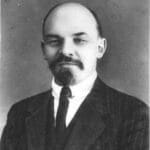About the text:
From: V.I. Lenin: On Imperialism and Opportunism, Futura 1974, 103 p., pp. 57-58.
(Extract)
Written August-October 1916,
first published in the magazine
“Zvezda” No. 1 and 2, 1924.
(…)
5. “Monism and Dualism”
(…)
Is the actual condition of the workers in the oppressor and in the oppressed nations the same, from the standpoint of the national question?
No, it is not the same.
(1) Economically, the difference is that sections of the working class in the oppressor nations receive crumbs from the superprofits the bourgeoisie of these nations obtains by extra exploitation of the workers of the oppressed nations. Besides, economic statistics show that here a larger percentage of the workers become “straw bosses” than is the case in the oppressed nations, a larger percentage rise to the labour aristocracy. That is a fact. To a certain degree the workers of the oppressor nations are partners of their own bourgeoisie in plundering the workers (and the mass of the population) of the oppressed nations.
(2) Politically, the difference is that, compared with the workers of the oppressed nations, they occupy a privileged position in many spheres of political life.
(3) Ideologically, or spiritually, the difference is that they are taught, at school and in life, disdain and contempt for the workers of the oppressed nations. This has been experienced, for example, by every Great Russian who has been brought up or who has lived among Great Russians.
Thus, all along the line there are differences in objective reality, i.e., “dualism” in the objective world that is independent of the will and consciousness of individuals.
That being so, how are we to regard P. Kievsky’s assertion about the “monistic action of the International”?
It is a hollow, high-sounding phrase, no more:
In real life the International is composed of workers divided into oppressor and oppressed nations. If its action is to be monistic, its propaganda must not be the same for both. That is how we should regard the matter in the light of real (not Dühringian) “monism”, Marxist materialism.
(…)
5) Why must “we” “actively resist” suppression of a national uprising? P. Kievsky advances only one reason: “… we shall thereby be combating imperialism, our mortal enemy.” All the strength of this argument lies in the strong word “mortal”. And this is in keeping with his penchant for strong words instead of strong arguments – high-sounding phrases like “driving a stake into the quivering body of the bourgeoisie” and similar Alexinsky flourishes.
But this Kievsky argument is wrong. Imperialism is as much our “mortal” enemy as is capitalism. That is so. No Marxist will forget, however, that capitalism is progressive compared with feudalism, and that imperialism is progressive compared with pre-monopoly capitalism. Hence, it is not every struggle against imperialism that we should support. We will not support a struggle of the reactionary classes against imperialism; we will not support an uprising of the reactionary classes against imperialism and capitalism.
Consequently, once the author admits the need to support an uprising of an oppressed nation (“actively resisting” suppression means supporting the uprising), he also admits that a national uprising is progressive, that the establishment of a separate and new state, of new frontiers, etc., resulting from a successful uprising, is progressive.
(…)
LCW Vol. 23, p. 55-56, p. 63.
The full text can be found online on Marxist Internet Archive:
https://www.marxists.org/archive/lenin/works/1916/carimarx/index.htm


























